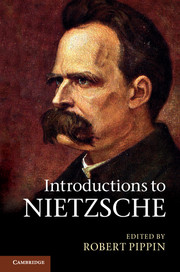Book contents
- Frontmatter
- Contents
- Note to the reader
- Chronology of Nietzsche's life and works
- Introduction
- Chapter 1 Nietzsche: Writings from the early notebooks
- Chapter 2 Nietzsche: The Birth of Tragedy
- Chapter 3 Nietzsche: Untimely Meditations
- Chapter 4 Nietzsche: Human, All Too Human
- Chapter 5 Nietzsche: Daybreak
- Chapter 6 Nietzsche: The Gay Science
- Chapter 7 Nietzsche: Thus Spoke Zarathustra
- Chapter 8 Nietzsche: Beyond Good and Evil
- Chapter 9 Nietzsche: On the Genealogy of Morality
- Chapter 10 Nietzsche: The Anti-Christ, Ecce Homo, Twilight of the Idols
- Chapter 11 Nietzsche: Writings from the late notebooks
- Select bibliography
- Index
- References
Chapter 1 - Nietzsche: Writings from the early notebooks
Published online by Cambridge University Press: 05 June 2012
- Frontmatter
- Contents
- Note to the reader
- Chronology of Nietzsche's life and works
- Introduction
- Chapter 1 Nietzsche: Writings from the early notebooks
- Chapter 2 Nietzsche: The Birth of Tragedy
- Chapter 3 Nietzsche: Untimely Meditations
- Chapter 4 Nietzsche: Human, All Too Human
- Chapter 5 Nietzsche: Daybreak
- Chapter 6 Nietzsche: The Gay Science
- Chapter 7 Nietzsche: Thus Spoke Zarathustra
- Chapter 8 Nietzsche: Beyond Good and Evil
- Chapter 9 Nietzsche: On the Genealogy of Morality
- Chapter 10 Nietzsche: The Anti-Christ, Ecce Homo, Twilight of the Idols
- Chapter 11 Nietzsche: Writings from the late notebooks
- Select bibliography
- Index
- References
Summary
No modern philosopher has been read in as many different ways or appropriated by as many diverse schools of thought, social and political movements or literary and artistic styles as Nietzsche – perhaps, Plato's towering figure aside, no philosopher ever. Notorious during much of the twentieth century as a ‘precursor’ of German National Socialism, he was also an inspiration to left-wing and avant-garde radicalism in the century's early years as well as to the European and American academic left toward the century's end. Denounced by some for undermining all traditional faith in truth and goodness, he has been praised by others for confronting honestly and truthfully the harmful and deceptive ideals of a self-serving past.
Nietzsche's almost irresoluble ambiguity and many-sidedness are partly generated by his style of writing – playful, hyperbolic, cantering and full of twists and turns – and by his fundamental philosophical conviction that ‘the more affects we allow to speak about a thing, the more eyes, various eyes we are able to use for the same thing, the more complete will be our “concept” of the thing, our “objectivity”'. Nietzsche was intentionally a philosopher of many masks and many voices. His purported objectivity is also due to the fact that most of his writing (more than two thirds of his total output, not counting his voluminous correspondence) has come to us in the form of short notes, drafts of essays and outlines of ideas and books he never published – fragmentary texts that allow great latitude in interpretation. These unpublished writings – his Nachlass – were mostly inaccessible until the recent publication of the standard edition of his works. His readers had to rely on a series of different editors who, beginning with his own sister, selected the texts to be published according to their own preconceptions, arranged them in idiosyncratic ways, and sometimes attributed to him ideas and even whole books he had never himself contemplated.
Keywords
Information
- Type
- Chapter
- Information
- Introductions to Nietzsche , pp. 17 - 43Publisher: Cambridge University PressPrint publication year: 2012
References
Accessibility standard: Unknown
Why this information is here
This section outlines the accessibility features of this content - including support for screen readers, full keyboard navigation and high-contrast display options. This may not be relevant for you.Accessibility Information
- 18
- Cited by
